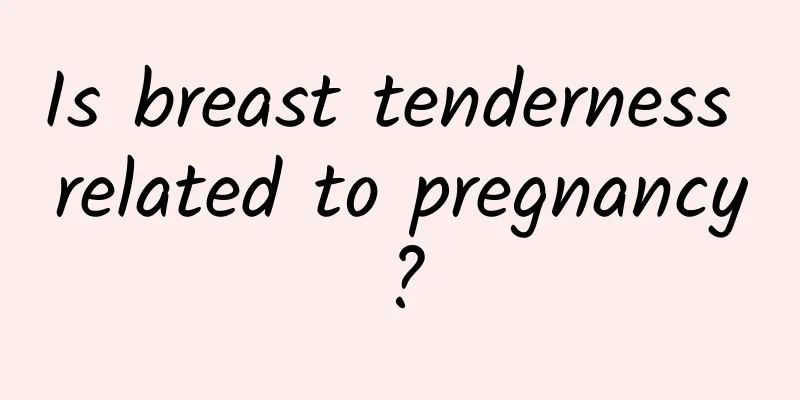Is breast tenderness related to pregnancy?

|
A common problem faced by female friends is breast pain. There are many reasons for breast pain, which often occurs before menstruation. In addition, is breast tenderness related to pregnancy? In fact, there is no necessary connection between breast pain and pregnancy. Breast pain is not necessarily caused by pregnancy, but pregnant women may experience breast pain. Let’s take a closer look at the causes of breast tenderness. First of all, we need to identify the cause of the disease.Breast pain can be divided into physiological pain, psychological pain and pathological pain. Physiological breast tenderness is common during adolescence, before menstruation, ovulation, pregnancy, and postpartum period: Adolescent tenderness usually occurs between the ages of 9 and 13. At this time, the girl's breasts begin to develop and there is slight swelling and pain. After menarche, it will disappear on its own as the breasts mature. Premenstrual breast pain: More than half of women experience breast fullness, hardness, and tenderness before menstruation. This is caused by increased estrogen levels in the body before menstruation, breast hyperplasia, and edema of the breast interstitial tissue. The above symptoms may disappear after menstruation. Breast tenderness during ovulation: Due to the influence of hormones in the body during ovulation, a small number of women will experience breast tenderness or nipple pain (even unable to touch the nipples), which may last until the eve of the next menstrual period.Pain and distension during pregnancy: In the early stages of pregnancy, due to the large amount of estrogen, progesterone and prolactin secreted by the placenta and villi, breast hyperplasia and breast enlargement occur, causing breast distension and pain. For some pregnant women, this pain may last throughout the entire pregnancy and does not require treatment. Postpartum swelling and pain: Breast swelling, hardness and pain may often occur 3-7 days after delivery. This is mainly caused by breast lymph retention, venous congestion, interstitial edema and obstruction of mammary ducts. After an artificial abortion: After an artificial abortion, women often feel breast pain. This is because the pregnancy is suddenly interrupted and the hormone levels in the body drop sharply, causing the newly developed mammary glands to suddenly stop growing, resulting in breast lumps and breast pain. Pathological breast pain is common in the following diseases: breast hyperplasia, mastitis, breast cancer and other diseases. Usually, these diseases are accompanied by other clinical symptoms in addition to breast pain. For example, breast hyperplasia is often accompanied by breast lumps, menstrual disorders and other symptoms; mastitis, the breasts are often accompanied by typical manifestations such as redness, swelling, heat, and pain; breast cancer, which often occurs in women between 40 and 60 years old, is often accompanied by inflammation. Painful breast cancer often indicates that it is in the late stage, and is often accompanied by breast lumps, nipple discharge, nipple changes, skin changes, axillary lymph node enlargement, etc. In addition, mental factors such as stress and tension can also cause breast pain. |
<<: Don't do surgery for hemorrhoids
>>: How to check breasts is normal
Recommend
Can apple juice cure diarrhea?
There are many reasons for diarrhea. When most fr...
What to do if the baby is too fat
Every child becomes the treasure of the family af...
Urine white blood cell count is high
The things we do every day are inseparable from e...
What are the dangers of increased bone density?
As for the question of what bone density is, I be...
Taboos of dermatitis care
The skin is the largest organ in our human body. ...
What problems can ovarian dysfunction cause? How to solve it?
The ovaries are the most important reproductive o...
What should I do if I have rheumatism pain when it rains?
Many people seek coolness when the rainy season c...
What are the Chinese herbal contraceptive pills?
There are many kinds of contraceptive pills sold ...
Why do you get Sjögren's syndrome?
Sjögren's syndrome is a relatively rare autoi...
What are the methods of moxibustion for treating colds?
Influenza is a relatively common disease, especia...
What is Korean Ginseng
Many people know that ginseng is a very precious ...
Why do breasts become swollen and painful? Hot compress massage to relieve pain
During pregnancy, many women will feel chest disc...
How to quickly lower blood sugar in pregnant women
During pregnancy, many women will experience vari...
What to do if the calf itches and bleeds
The calves are itchy and there will be bleeding s...
What constitutes high-risk sexual behavior
With the opening up of social atmosphere, many pe...









